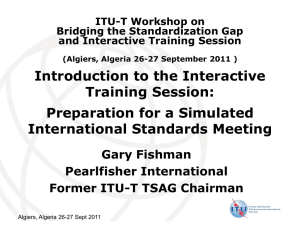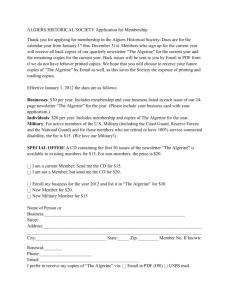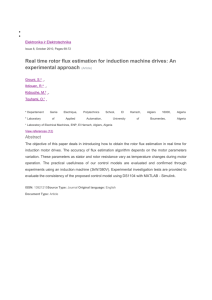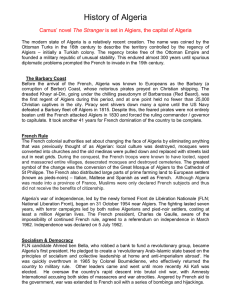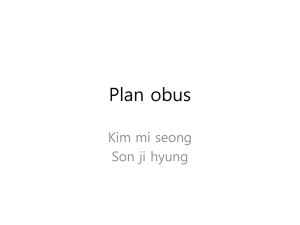Effective Participation in International Standards Meetings Gary Fishman Pearlfisher International
advertisement
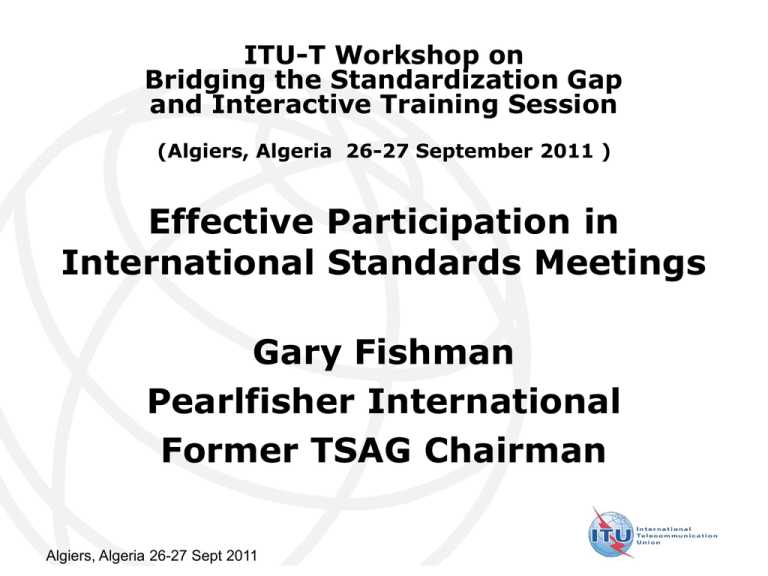
ITU-T Workshop on Bridging the Standardization Gap and Interactive Training Session (Algiers, Algeria 26-27 September 2011 ) Effective Participation in International Standards Meetings Gary Fishman Pearlfisher International Former TSAG Chairman Algiers, Algeria 26-27 Sept 2011 Outline Characteristics of international standards meetings Preparation for standards meetings How to write a good contribution How to prepare external and internal reports Concrete measures for developing countries Algiers, Algeria 26-27 Sept 2011 2 Characteristics of international standards meetings What makes standards meetings different from other meetings? Why does “International” make a difference? What skills are important? Who has a role to play in management of a meeting? Algiers, Algeria 26-27 Sept 2011 3 Standards meetings (1) There are many types of meetings The goal of a standards meeting is to create agreements Requires, at the end, written words Definitions become critical Language becomes critical Clarity is demanded Algiers, Algeria 26-27 Sept 2011 4 Standards meetings (2) Usually involves: Travel - leave sufficient time before and after the meeting! Large preparatory time Clear, written rules to ensure openness, transparency, due process Intense meetings and long hours Written reports Multiple iterations between first efforts and final product Algiers, Algeria 26-27 Sept 2011 5 International (1) There might not be a natural commonality of interests or goals National and regional differences Marketplaces are different Regulations are different Large-scale competition Cultural differences Everyone comes with their own language but all work in one language Algiers, Algeria 26-27 Sept 2011 6 International (2) Translation is inherently imprecise but precision is demanded Sometimes lack of precision has been deliberate International standards can be used to help, or hinder, trade and national/regional influence Algiers, Algeria 26-27 Sept 2011 7 Participant vs. Chair (1) Chair Look at the „big picture‟ Goals for the meeting Know who will attend Set agenda and timing Anticipate what might happen; talk to people Have a backup plan Be neutral Algiers, Algeria 26-27 Sept 2011 Participant Look at your particular work items Goals for the meeting Do advance work to gain allies Anticipate what might happen Have a backup plan 8 Participant vs. Chair (2) Chair When confronted with a challenge, listen; don‟t react; talk to those on the other side of the issue; don‟t react. Seek ways for others to resolve their differences Chair‟s job is to enable win-win Algiers, Algeria 26-27 Sept 2011 Participant When confronted with a challenge, listen and respond to explain and defend your position Seek ways to gain support from others to overcome differences Your job is to win what is most important to you 9 Outline Characteristics of international standards meetings Preparation for standards meetings How to write a good contribution How to prepare external and internal reports Concrete measures for developing countries Algiers, Algeria 26-27 Sept 2011 10 Participant Perspective: Preparation (1) At least 2 to 3 times as much time for preparation as for the meeting itself Anticipate Talk with others, especially the ones you would rather not talk to Set reasonable expectations Know your trade-offs between winning 100% and the time that might be needed No one wins 100% of everything Algiers, Algeria 26-27 Sept 2011 11 Participant Perspective: Preparation (2) Write down your objectives TAKE-AWAY: Understand what are the MOST important things to you Allow sufficient travel time Plan to be at all the meetings Algiers, Algeria 26-27 Sept 2011 12 Participant Perspective: At the Meeting (1) LISTEN to others Present contributions clearly TAKE-AWAY: Practice at home; practice the night before DO NOT READ to the meeting State the issue, the broad means to solve it, your proposal Algiers, Algeria 26-27 Sept 2011 13 Participant Perspective: At the Meeting (2) Talk off-line with others Do not eat only with your own colleagues HARDEST TAKE-AWAY: Introduce yourselves to those you don‟t know Continue to build relationships Winning does not mean making the other person lose Algiers, Algeria 26-27 Sept 2011 14 Participant Perspective: At the Meeting (3) Know the decision-makers Continuity and personal relationships are key BIGGEST TAKE-AWAY: To be successful in standards, BE THERE! Algiers, Algeria 26-27 Sept 2011 15 Leadership Perspective: Preparation (1) Review where the group is Anticipate who will do what Constructive contributors Troublemakers – the „bad boys‟ Consult, to find out what is really the most important thing for each side It is NOT always what they say in public Algiers, Algeria 26-27 Sept 2011 16 Leadership Perspective: Preparation (2) Organization of the meeting Agenda Time management (Work Plan) Consult Set reasonable, stretch objectives TAKE-AWAY: plan your meeting times for each agenda item and stick to it as much as possible Algiers, Algeria 26-27 Sept 2011 17 Leadership Perspective: Chairing the Meeting (1) Be neutral Be calm TAKE-AWAY: Do NOT respond to every intervention Actively keep the meeting on track Scope Time In meeting sessions and off-line Algiers, Algeria 26-27 Sept 2011 18 Leadership Perspective: Chairing the Meeting (2) Don‟t panic At least, don‟t panic too soon Let everyone have their say They will do it eventually, so you should be in control of when it happens All interventions go thru the Chair: Everyone says: “Thank you, Mr. Chairman” to start and to stop speaking Algiers, Algeria 26-27 Sept 2011 19 Leadership Perspective: Chairing the Meeting (3) Learn when to close a discussion Repetition of viewpoints Public debate get too hot LISTEN and WATCH faces and body language Participants will tell you when it‟s time, if you are listening to them They will thank you later Algiers, Algeria 26-27 Sept 2011 20 Leadership Perspective: Chairing the Meeting (4) The ultimate management tools: The Coffee Break Shift the burden to those causing the problem: Those who object must also propose a solution Silence is agreement – use carefully Algiers, Algeria 26-27 Sept 2011 21 Leadership Perspective: Chairing the Meeting (5) TAKE-AWAY: Avoid humor – it does not translate well between cultures Consult LISTEN and know when to BE QUIET Let the opposing parties work out their differences Algiers, Algeria 26-27 Sept 2011 22 Leadership Perspective: Chairing the Meeting (6) Speak clearly Avoid colloquial expressions Be a leader that facilitates agreement, not a leader that imposes agreements TAKE-AWAY: Everyone should be able to go home claiming victory! Algiers, Algeria 26-27 Sept 2011 23 Management Skills For International Standards Meetings Cannot force an international standards meeting to do what it does not want to do - i.e., the fictional “Power of the Chair” The real Power of the Chair is to help the meeting come to agreements by setting the right environment Algiers, Algeria 26-27 Sept 2011 24 Management Skills For International Standards Meetings ITU: An extra element is added – Many sovereign Governments!! TAKE-AWAY: Never require that a government take a public position or make a public statement of support or opposition until they are ready to do so Use the principle of “unopposed agreement” Algiers, Algeria 26-27 Sept 2011 25 Outline Characteristics of international standards meetings Preparation for standards meetings How to write a good contribution How to prepare external and internal reports Concrete measures for developing countries Algiers, Algeria 26-27 Sept 2011 26 How to prepare a contribution (1) State the issue to be addressed State your proposal and provide sufficient support to be convincing Include a brief statement of your proposal in the opening Section This helps the reader understand what you will be saying Provide only the necessary background information: this is generally very short Algiers, Algeria 26-27 Sept 2011 27 How to prepare a contribution (2) End with a Section called Conclusion or Proposal Add an Abstract at the beginning One proposal per contribution is the best approach Combining multiple proposals in one contribution could mean if one fails, all fail Guidelines are found in Rec ITU-T A.2 (http://www.itu.int/rec/T-REC-A.2200810-I) Algiers, Algeria 26-27 Sept 2011 28 Outline Characteristics of international standards meetings Preparation for standards meetings How to write a good contribution How to prepare external and internal reports Concrete measures for developing countries Algiers, Algeria 26-27 Sept 2011 29 Internal Reporting (1) Short reports for your management What was at stake Who was there What happened, and whether it was good for you or bad for you TAKE-AWAY: Tell management what they need to know, not what you need to know Algiers, Algeria 26-27 Sept 2011 30 Internal Reporting (2) Planning horizon for at least the next 2 meetings and preferably through approval of the new standard Consider where to put future efforts Working level Middle management Higher management Algiers, Algeria 26-27 Sept 2011 31 Internal Reporting (3) Format and substance of internal reports will vary depending on the intended audience: e.g., colleagues, developers, middle management, upper management Many ways in which to report Each kind of report must fit into the Standards Management structure and processes of your organization Should have a standard report format Algiers, Algeria 26-27 Sept 2011 32 External Reporting When reporting from a leadership position, such as a Chair, Rapporteur or Editor: Do not abuse your position Do not change substance under the name of editorial fixes Fulfill your commitments Algiers, Algeria 26-27 Sept 2011 33 How to prepare a meeting report (1) A meeting report is NOT meeting minutes Include required information, e.g.: Agenda Participant list (if not found elsewhere) Title and source of each document with a very short summary of what it says Concise report on the highlights of any discussion Clear statement of the resulting decision of the group. Algiers, Algeria 26-27 Sept 2011 34 How to prepare a meeting report (2) Be brief State the issue fairly Give the main points accurately State conclusions Do not use judgmental language Include verbatim comments only when specifically requested Sensitive agreements should be recorded exactly as agreed – do not paraphrase! Algiers, Algeria 26-27 Sept 2011 35 Outline Characteristics of international standards meetings Preparation for standards meetings How to write a good contribution How to prepare external and internal reports Concrete measures for developing countries Algiers, Algeria 26-27 Sept 2011 36 What concrete steps can you take? Decide what you want – this is #1 Technical training is necessary Technical training is not enough Also need training on the standardization process and how to use it effectively Get TIES* accounts for your experts (http://www.itu.int/TIES/registration/index.html) *TIES: ITU‟s Telecom Information Exchange Services Algiers, Algeria 26-27 Sept 2011 37 Standardization Development Ladder Entering proposals at WTSA on future study questions and work programmes Nominating representatives as study group chairs, vicechairs. rapporteurs, focus group chairs etc Giving contributions at Study Groups and related meetings Attracting ITU meetings and/or regional groups (Res 54) Going to Study Groups and related meetings ITU Sector and Associate Membership National training and capacity-building in use of ITU Recommendations Growing usage of ITU Recommendations Propose Questions & work program Nominate Chair, VC, Rapp, FG Chair.. Give contributions at meetings Attract ITU mtgs & regional groups Go to SG and related meetings Sector Membership and Associate Nat’l Training/CB: use of ITU Recs Growing use of ITU Recs Algiers, Algeria 26-27 Sept 2011 38 Where on the Ladder do you want to be in 5-10 years? Why are you not there now? E.G., Lack of technical know-how Lack of standards know-how Lack of a strategy Language issues Financial aspects Lack of interest Algiers, Algeria 26-27 Sept 2011 39 What concrete steps can you take? Put someone in charge of your standards programme With a budget Get familiar with ITU-T web site (hppt://www.itu.int) e.g., Delegate Resources (http://www.itu.int/ITU-T/info/dresources.html) Information on ITU, Geneva, member services, tutorials, guidelines Start attending selected meetings – attend consistently Algiers, Algeria 26-27 Sept 2011 40 What concrete steps can you take? Volunteer at the working level Be in a Drafting Group, Lead a Drafting Group, be an Editor, Associate Rapporteur, Rapporteur Don‟t need to be an expert Your help will be appreciated Establish an internal reporting process FOCUSED ON POLICY AND BUSINESS NEEDS, not standards needs Algiers, Algeria 26-27 Sept 2011 41 Points to Consider Where are you on the Standardization Development Ladder? Where would you like to be? Why aren‟t you there? What can you do: Now Later Algiers, Algeria 26-27 Sept 2011 42 DO IT NOW! To Bridge the Standardization Gap, what are the 3 things you can do first? e.g., appoint an internal coordinator today: no cost, no delay; get a TIES account What will you need in your toolkit to move up 2 rungs of the Standardization Development Ladder? Algiers, Algeria 26-27 Sept 2011 43 Thank you Mr. Gary Fishman PEARLFISHER INTERNATIONAL Tel: +1 732 778-9572 Fax: +1 732 583-3051 gryfishman@aol.com Skype: gryfishman Algiers, Algeria 26-27 Sept 2011 44
